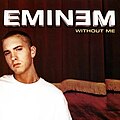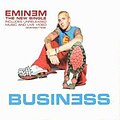The Eminem Show: Difference between revisions
No edit summary |
No edit summary |
||
| Line 26: | Line 26: | ||
It was intended to be released in June 2002, but Interscope decided to release the album early on [[May 28]] when pirated copies of the tracks began to pop up on popular [[peer-to-peer]] [[file sharing]] networks and even played on the radio for the first time on the popular [[Opie and Anthony]] radio show. In the U.S. however, many stores actually began selling on Sunday, [[May 26]], [[2002]]. |
It was intended to be released in June 2002, but Interscope decided to release the album early on [[May 28]] when pirated copies of the tracks began to pop up on popular [[peer-to-peer]] [[file sharing]] networks and even played on the radio for the first time on the popular [[Opie and Anthony]] radio show. In the U.S. however, many stores actually began selling on Sunday, [[May 26]], [[2002]]. |
||
''The Eminem Show'' is a reflective album, featuring a more personal and serious side of Eminem but presents a lighter, and not as hard-core/controversial/darker feel than his previous albums. He still sparks controversy in this album but not nearly as much as ''[[The Marshall Mathers LP]]''. Many say this was the album where Eminem started to lighten-up and become more of a happier man. This is true, and Eminem has admitted it himself, because he received custody of his daughter. He touches on the issues of race in Hip Hop, especially in the second track on the album, "White America", his childhood, especially in "Cleanin' Out My Closet", his conviction for assaulting a nightclub bouncer in 2000, his status as a both a hip-hop and pop superstar, and his relationship with his ex-wife Kim and daughter Hailie. Unlike ''[[The Marshall Mathers LP]]'', ''The Eminem Show's'' release came off without significant complaints about [[misogyny]] or [[homophobia]]. This is likely due to the fact that the album does not prominently feature the word "[[faggot (epithet)|faggot]]", or other derogatory terms directed towards [[homosexuals]], and no tracks are potentially offensive or misogynistic in the mold of "Kill You" or "Kim" on the previous album. While some shock-oriented lyrics are still present, they are significantly toned down in terms of controversy. However there was a mild controversy involving the song "White America", as it features hateful messages to [[Tipper Gore]] and [[Lynne Cheney]] (his top critics), also it features several themes involving [[White supremacy]]. |
''The Eminem Show'' is a reflective album, featuring a more personal and serious side of Eminem but presents a lighter, and not as hard-core/controversial/darker feel than his previous albums. He still sparks controversy in this album but not nearly as much as ''[[The Marshall Mathers LP]]''. Many say this was the album where Eminem started to lighten-up and become more of a happier man. This is true, and Eminem has admitted it himself, because he received custody of his daughter. He touches on the issues of race in Hip Hop, especially in the second track on the album, "White America", his childhood, especially in "Cleanin' Out My Closet", his conviction for assaulting a nightclub bouncer in 2000, his status as a both a hip-hop and pop superstar, and his relationship with his ex-wife Kim and daughter Hailie. Unlike ''[[The Marshall Mathers LP]]'', ''The Eminem Show's'' release came off without significant complaints about [[misogyny]] or [[homophobia]]. This is likely due to the fact that the album does not prominently feature the word "[[faggot (epithet)|faggot]]", or other derogatory terms directed towards [[homosexuals]], and no tracks are potentially offensive or misogynistic in the mold of "Kill You" or "Kim" on the previous album. While some shock-oriented lyrics are still present, they are significantly toned down in terms of controversy. |
||
However there was a mild controversy involving the song "White America", as it features hateful messages to [[Tipper Gore]] and [[Lynne Cheney]] (his top critics), also it features several themes involving [[White supremacy]], including one that references that Eminem wouldn't sell much if he were [[African American|black]] indicating that black musicans sell less than their white counterparts. |
|||
The album also saw Eminem take a substantially more predominant production role; most of it was self-produced, with longtime collaborator [[Bass Brothers|Jeff Bass]] co-producing several tracks. [[Dr. Dre]], in addition to being the album's executive producer, produced three individual tracks: "[[Business (song)|Business]]," "Say What You Say," and "My Dad's Gone Crazy." |
The album also saw Eminem take a substantially more predominant production role; most of it was self-produced, with longtime collaborator [[Bass Brothers|Jeff Bass]] co-producing several tracks. [[Dr. Dre]], in addition to being the album's executive producer, produced three individual tracks: "[[Business (song)|Business]]," "Say What You Say," and "My Dad's Gone Crazy." |
||
Revision as of 18:11, 1 April 2007
| Untitled | |
|---|---|
The Eminem Show is Eminem's third album after signing to a major label, Aftermath Entertainment.
Before the release of The Eminem Show, Eminem was trying to think of a title for the CD. He was going to use the regular suffix that he used on all of the other CDs: LP/EP, but decided that it would get bland after awhile. So he instead put the word "show" into it.
It was intended to be released in June 2002, but Interscope decided to release the album early on May 28 when pirated copies of the tracks began to pop up on popular peer-to-peer file sharing networks and even played on the radio for the first time on the popular Opie and Anthony radio show. In the U.S. however, many stores actually began selling on Sunday, May 26, 2002.
The Eminem Show is a reflective album, featuring a more personal and serious side of Eminem but presents a lighter, and not as hard-core/controversial/darker feel than his previous albums. He still sparks controversy in this album but not nearly as much as The Marshall Mathers LP. Many say this was the album where Eminem started to lighten-up and become more of a happier man. This is true, and Eminem has admitted it himself, because he received custody of his daughter. He touches on the issues of race in Hip Hop, especially in the second track on the album, "White America", his childhood, especially in "Cleanin' Out My Closet", his conviction for assaulting a nightclub bouncer in 2000, his status as a both a hip-hop and pop superstar, and his relationship with his ex-wife Kim and daughter Hailie. Unlike The Marshall Mathers LP, The Eminem Show's release came off without significant complaints about misogyny or homophobia. This is likely due to the fact that the album does not prominently feature the word "faggot", or other derogatory terms directed towards homosexuals, and no tracks are potentially offensive or misogynistic in the mold of "Kill You" or "Kim" on the previous album. While some shock-oriented lyrics are still present, they are significantly toned down in terms of controversy.
However there was a mild controversy involving the song "White America", as it features hateful messages to Tipper Gore and Lynne Cheney (his top critics), also it features several themes involving White supremacy, including one that references that Eminem wouldn't sell much if he were black indicating that black musicans sell less than their white counterparts.
The album also saw Eminem take a substantially more predominant production role; most of it was self-produced, with longtime collaborator Jeff Bass co-producing several tracks. Dr. Dre, in addition to being the album's executive producer, produced three individual tracks: "Business," "Say What You Say," and "My Dad's Gone Crazy."
The Eminem Show was the best-selling album of 2002, with 7.6 million copies by year end. At the Grammy Awards of 2003 it was nominated for Album of the Year and became Eminem's third straight LP to win the award for Best Rap Album.
Track listing
All tracks produced by Eminem except for "Business", "Say What You Say", and "My Dad's Gone Crazy", which are produced by Dr. Dre.
- "Curtains Up (Skit)" – 0:29
- "White America" (Bass/King/Mathers/Resto) (Co-produced by Jeff Bass for F.B.T. Productions) – 5:24
- "Business" (Bass/King/Mathers/Resto/Young) (Produced by Dr. Dre) – 4:11
- "Cleanin' Out My Closet" (Bass/Mathers) (Produced by Eminem and Jeff Bass) – 4:57
- "Square Dance" (Bass/Mathers/Resto) – 5:23
- "The Kiss (Skit)" (Bass/Mathers) – 1:15 (Performed by Eminem & "Gary")
- "Soldier" (Mathers/Resto) – 3:46
- "Say Goodbye Hollywood" (Elizondo/Mathers/Resto) – 4:32
- "Drips" (featuring Obie Trice) (Bass/Mathers/Porter/Trice) – 4:45
- "Without Me" (Bass/Bell/Dudley/Horn/Mathers/McLaren) (Co-produced by Jeff Bass) – 4:50
- Contains resung elements from "Buffalo Gals" by Malcolm McLaren & an uncredited sample of "It's Gonna Be Such a Beautiful Day" by The Moments
- "Paul Rosenberg (Skit)" (Performed by Paul D. Rosenberg, Esq.) – 0:22
- "Sing for the Moment" (Bass/King/Mathers/Resto/Tyler) (Co-produced by Jeff Bass) – 5:39
- "Superman" (Bass/King/Mathers) (Additional production by Jeff Bass) – 5:50
- "Hailie's Song" (Mathers/Resto) – 5:20
- "Steve Berman (Skit)" (Performed by Eminem and Steve Berman) – 0:33
- "When the Music Stops" (featuring D12) (Carlisle/Feemster/Johnson/Mathers/Moore/Porter) (Co-produced by Denaun Porter) – 4:29
- "Say What You Say" (featuring Dr. Dre) (Elizondo/Feemster/Mathers/Young) (Produced by Dr. Dre) – 5:09
- "'Till I Collapse" (featuring Nate Dogg) – 4:57
- Contains an uncredited sample of "We Will Rock You" by Queen
- "My Dad's Gone Crazy" (featuring Hailie Jade) (Elizondo/Feemster/Mathers/Young) (Produced by Dr. Dre) – 4:27
- "Curtains Close (Skit)" (Performed by Ken Kaniff) – 1:01
Note: "Drips" does not appear on some edited versions of the album.
Credits
- Eminem - Performer/Producer
- Dr. Dre - Executive producer/Producer/Performer
- Jeff Bass - Producer/Co-writer
- Luis Resto - Keyboards/Co-writer
- Obie Trice - Performer
- Dina Rae - Vocals
- D12 - Performers
- Nate Dogg - Vocals
- Hailie Jade - Performer
- Mike Elizondo - Bass/Co-writer
Album singles
| Single cover | Single information |
|---|---|
 |
"Without Me" |
 |
"Cleanin' Out My Closet"
|
 |
"Sing for the Moment"
|
 |
"Business (featuring Dr. Dre)" |
Promotional singles were also released for "Superman" (featuring Dina Rae) and "Til I Collapse" (featuring Nate Dogg) [1].
